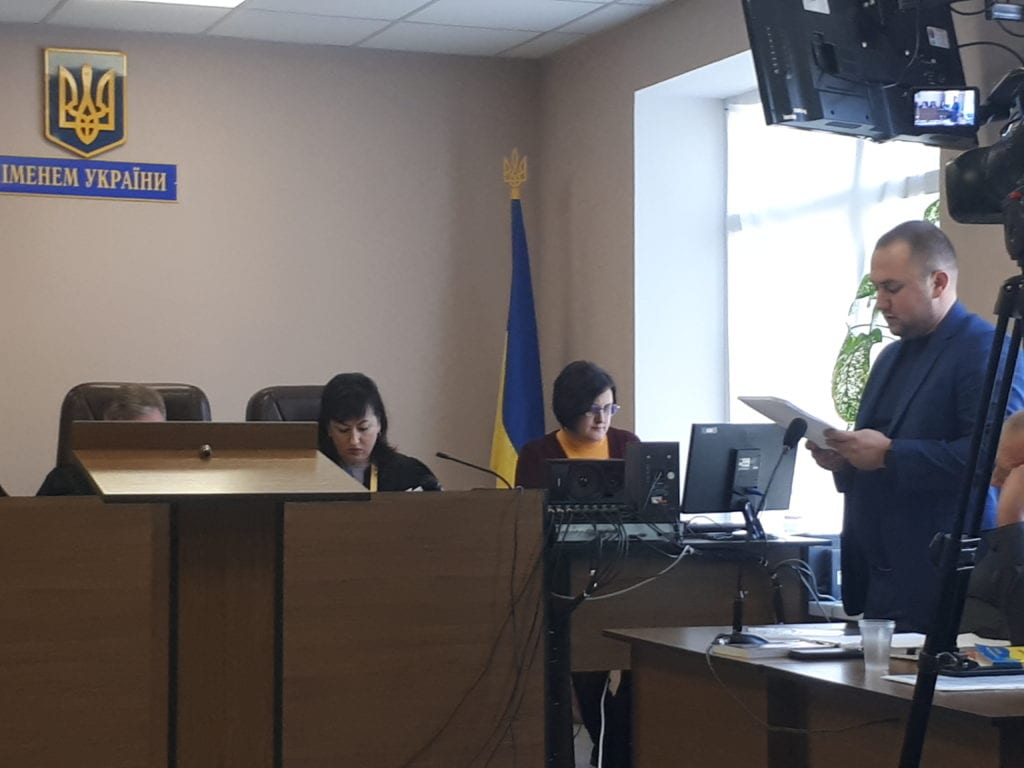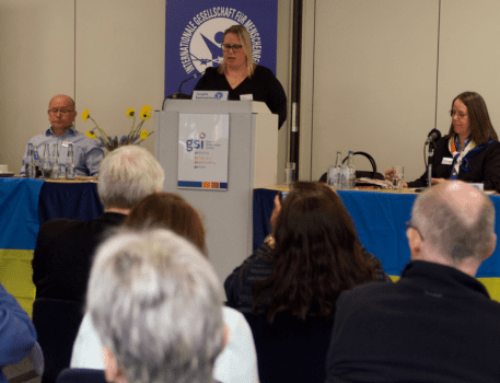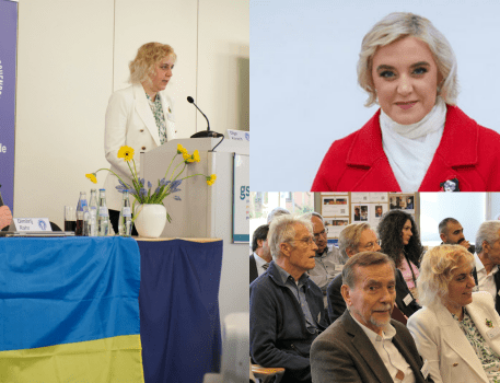Monitoring of the case of A. Melnik, A. Kryzhanovsky, I. Pasichny, I. Kunik (session 09.25.19)

On September 25, a regular court session was held in the Gadyachsky District Court of Poltava Region in the case of the head of the “Visit” television company Alexander Melnik, who is one of the four accused (together with A. Kryzhanovsky, I. Pasichny, I. Kunik) in the case of the murder of the mayor of Kremenchug A. Babayev and the judge of the Kremenchug court A. Lobodenko. The International Society for Human Rights continues to monitor this trial.
Accused Melnik, Kryzhanovsky and Kunyk have been in custody for more than 5 years. The case has been considered repeatedly from the very beginning in the courts due to changes in territorial jurisdiction and is currently under consideration of the first episode (out of two).
At this hearing, the prosecution submitted a motion to amend the charge. This petition is motivated by the fact that the prosecution became aware of new circumstances during the trial, as a result of which it became necessary to change the charge for all the defendants in the case.
The defense side focused on the fact that new evidence appeared at the disposal of the prosecutor’s office after the accused I. Pasichny in the sixth year of pre-trial detention revealed a desire to agree to a guilty plea. It was investigative experiments with the participation of the accused I. Pasichny, according to the defense, that became the basis for the petition to change the charge.
Recall that all four are accused of using violence against a judge, contract killings by a group of persons by prior conspiracy with mercenary motives, part 3 article 27, part 2 article 28, part 2 article 377, part 3 article 27, paragraphs 6, 11, 12 part 2 of article 115 of the Criminal Code of Ukraine. Before, I. Kunyk and I. Pasichny were directly accused of murder in two different episodes. As a result of the petition filed by the prosecution, the prosecutor charged I. Kunik with intentional murder, made to order, with a preliminary conspiracy by a group of persons committed by a person who had previously committed a murder – paragraphs 6,11,12,13, part 2, article 115 of the Criminal Code of Ukraine.
Subsequently, the court announced a break in the court session in order to provide enough time for the defense in connection with the new charge.
The defense also expressed concern about ineffective appeal mechanisms against court rulings on the extension of detention. On May 11, 2019, the Gadyatsky District Court of the Poltava Region extended the period of detention of the accused in the case by 2 months. On this determination, the defendants A. Melnik filed an appeal.
By the ruling of the Sumy Court of Appeal dated 08.21.2019, the appeal was rejected, and the ruling of the trial court was left unchanged.
The Sumy Court of Appeal, justifying the risks of a possible obstacle to Melnik’s judicial review of the case, limited themselves to one sentence, which contained only a statement of the conclusion that there were corresponding risks.
At the same time, in §§ 100, 101, 102 of the Decision of the “Belevetskiy v. Russia” ECtHR, the court notes that in the case under consideration, the only reason for continuing the applicant’s detention was the fact that he was charged with a particularly serious criminal offense, danger which was considered as sufficient reason for his detention.
The ECtHR has repeatedly stated that, although the severity of the sentence is an important element in assessing the risk of escaping or re-committing a crime, the need to continue deprivation of liberty cannot be assessed from a purely abstract point of view, taking into account only the gravity of the crime. Continuation of detention also cannot be used to anticipate a sentence of imprisonment (see Panchenko, cited above, § 102; “Iliykov v. Bulgaria”, No. 33977/96, § 81, July 26, 2001; and “Letelje v. France”, decision of June 26, 1991, series A No. 207, § 51).
However, the Court reiterates that any system of compulsory detention pending trial is incompatible with Article 5 § 3 of the Convention, as the national authorities are obliged to establish and demonstrate the existence of specific facts that outweigh the rule of respect for individual freedom (see “Rokhlina v. Russia”, No. 54071/00, § 67, April 7, 2005, with further references). In this case, the domestic authorities did not state any specific facts confirming the detention orders.
ISHR experts are worried about the lack of justification for extending the measure of restraint in court rulings. Since the prosecutor must prove the existence of the corresponding risks of non-performance of procedural obligations, the court makes decisions on the extension of the measure of restraint based on the presence of specific facts that are contained in the application. Thus, in order to justify anything, it is enough for the court to lay out the facts cited by the prosecution in its decision. But in this case, prosecutors systematically ignore the norms of the Code of Criminal Procedure in terms of justifying the extension of the measure of restraint. Moreover, one of the prosecutors, when asked by the observer of the ISHR why the norms of Articles 177 and 183 of the Code of Criminal Procedure on justification of risks are not respected, replied that such a request is enough for this court. What was meant by this phrase, the representative of the prosecutor’s office did not explain.
Particular attention should be paid to the fact that during the appeal of the decision to extend the measure of restraint of 05/11/2019, the Gadyatskiy district court once again issued a new ruling of 07/04/2019 to extend the measure of restraint. At the same time, the Sumy Court of Appeal examined the complaint on 08/21/2019, when the already appealed ruling lost its force.
In this case, the ISHR experts draw attention to the apparent inefficiency of the appeal mechanism of the ruling on the extension of the measure of restraint.
The International Society for Human Rights will continue to monitor this trial. The next session will be held on October 10.








Leave A Comment